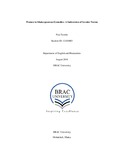| dc.contributor.advisor | Chowdhury, Rukhsana Rahim | |
| dc.contributor.author | Tasmia, Fiza | |
| dc.date.accessioned | 2017-03-12T09:30:47Z | |
| dc.date.available | 2017-03-12T09:30:47Z | |
| dc.date.copyright | 2016 | |
| dc.date.issued | 2016-08 | |
| dc.identifier.other | ID 12103003 | |
| dc.identifier.uri | http://hdl.handle.net/10361/7885 | |
| dc.description | This thesis is submitted in partial fulfillment of the requirements for the degree of Bachelor of Arts in English, 2016. | en_US |
| dc.description | Cataloged from PDF version of thesis. | |
| dc.description | Includes bibliographical references (page 45-47). | |
| dc.description.abstract | Feminism can be described as a social theory or movement which is aimed to value women power and their contribution toward society. This movement intends to establish equal social, economic and political rights as well as equal opportunity beyond any barrier of discrimination due to gender. The revolution of feminism can be divided into three waves. The first wave was in the late nineteenth and early twentieth centuries with the goal of forming equal rights for women in suffrage and elimination of slavery. In the 1960s the second wave was unfolded with the focus of social equality regardless of sex. The third wave took place in the 1990s with the concern to change the stereotypes against women in the media and languages. Feminist literary criticism tries to understand the role of literary texts in either reflecting or undermining the gender roles and expectations of a society. Feminist criticism studies the portrayal of female characters, patriarchy setting, gender role, power relation between genders in literature and explores issues such as discrimination, objectification, oppression, as well violence against women in writing. Shakespeare lived in a patriarchal culture, in which authority and privilege was particularly invested in the hands of men or patriarchs of the family. This paper aims to study the portrayal of women in Shakespearean comedies to highlight the fact that, Shakespeare has projected some strong female protagonists in his comedies to satirize the social and gender norms of the Elizabethan era. The thesis will try to understand the impact of gender norms and expectations on the narrative structure and the creation of characters in his plays. The hypothesis of this paper is that though Shakespeare has not promoted any precise ideology of feminism, the approaches of his female characters are not used as tools or elements of comedy. Behind the comic plot, Shakespeare has drawn strong female characters, to give a glimpse of the capability of women to the Elizabethan patriarchal society. The study is based on extensive analysis and reading of three comedies; As You Like It, Merchant Of Venice and Taming of The Shrew. | en_US |
| dc.description.statementofresponsibility | Fiza Tasmia | |
| dc.format.extent | 47 pages | |
| dc.language.iso | en | en_US |
| dc.publisher | BRAC University | en_US |
| dc.rights | BRAC University thesis are protected by copyright. They may be viewed from this source for any purpose, but reproduction or distribution in any format is prohibited without written permission. | |
| dc.subject | Shakespeare | en_US |
| dc.title | Women in Shakespearean comedies: a subversion of gender norms | en_US |
| dc.type | Thesis | en_US |
| dc.contributor.department | Department of English and Humanities, BRAC University | |
| dc.description.degree | B.A. in English | |

